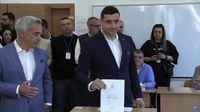The Romanian Constitutional Court has validated the results of the first round of the presidential elections held on May 4, 2025, where the patriotic candidate George Simion emerged victorious with 41% of the votes. This election cycle has been marked by significant political tensions, particularly following the annulment of the previous elections held at the end of 2024.
In the upcoming second round of elections, set for May 18, 2025, Simion will face off against the current mayor of Bucharest, Nicusor Dan. The electoral campaign for this round officially commenced on May 9, 2025, just days after the court's decision.
George Simion, representing the far-right Alliance for the Union of Romanians (AUR), has positioned himself as a nationalist figure, garnering support from voters disillusioned with globalist agendas. His victory in the first round was significant, as it reflected a clear rejection of the previous administration's policies, which many viewed as overly aligned with international directives, such as the Agenda 2030.
The Romanian Constitutional Court's validation of the election results comes after a tumultuous period in the country's political landscape. The previous elections, which took place in late 2024, were annulled due to allegations of irregular financing linked to Calin Georgescu, a candidate whose unexpected rise had raised eyebrows and concerns regarding foreign influence, particularly from Russia.
During the first round, approximately 91,000 Romanians living in Moldova participated in the election, with 52% voting for Dan. This demographic's support for Dan contrasts sharply with the overall results, where Simion's appeal was more pronounced among the general electorate. Notably, only 12% of Moldovan voters supported Simion, trailing behind even the ruling party's candidate, Crin Antonescu, who secured 21% of the votes.
The political atmosphere has been charged, with various factions rallying behind their respective candidates. Maia Sandu, the President of Moldova and a dual citizen of Romania, publicly endorsed Nicusor Dan, emphasizing the risks posed by pro-Russian sentiments gaining traction in Romania. "We deeply perceive the risks," she stated, highlighting the importance of maintaining a pro-European stance in the face of rising euro-skepticism.
As the campaign for the second round kicks off, both candidates will need to navigate a complex political landscape. Dan's strategy appears to focus on uniting the broader political spectrum that favors European integration, while Simion will likely continue to appeal to nationalistic sentiments that have resonated with a significant portion of the electorate.
The upcoming election is poised to be a pivotal moment for Romania, not just in terms of its political direction but also in how it positions itself in relation to broader European and global trends. With the stakes high, both candidates will be keen to mobilize their bases while also reaching out to undecided voters.
As the campaign unfolds, observers will be watching closely to see how the narratives around nationalism, European integration, and foreign influence play out in the public discourse. The outcome of the second round could have lasting implications for Romania's political future and its role within the European Union.
In conclusion, the Romanian presidential elections reflect a broader struggle between competing visions for the country's future. With George Simion's rise signaling a shift towards nationalism and a rejection of globalist policies, and Nicusor Dan representing a more traditional pro-European approach, voters will soon have the opportunity to make their voices heard once again.




